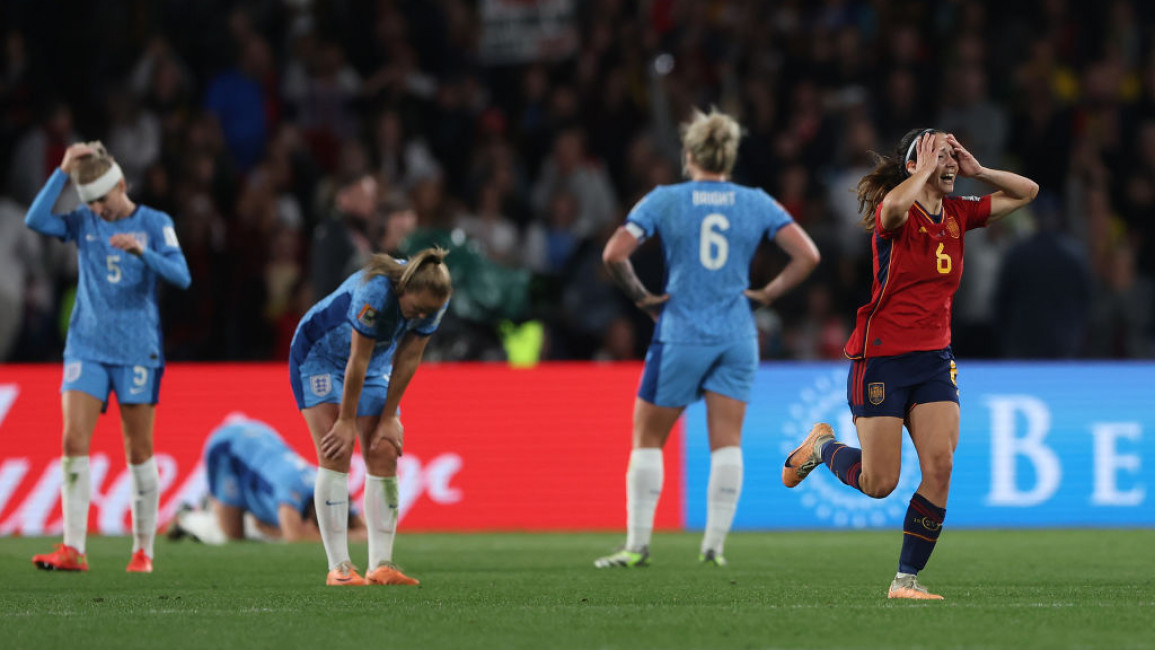Heartache but pride for England fans after Women's World Cup defeat
England fans watched the World Cup final against Spain on giant screens in parks with picnics, in packed local football clubhouses, and with early morning tea and coffee in pubs and bars.
There were stetson hats and blaring vuvuzelas, a sea of replica tops and red and white facepaint, and even a knight in a full suit of armour at one venue.
England's unofficial anthem "It's Coming Home" was belted out with good-natured gusto. "God Save the King" - the national anthem - got the full-throated treatment.
But their hopes of a first World Cup victory since the men's side in 1966 were not to be, even after goalkeeper Mary Earps' second-half penalty save - and 13 minutes of stoppage time - raised hopes of a comeback.
Spain's 1-0 victory was met with silence, tears and also sporting applause.
"It's upsetting," admitted administrator Yvonne Roswell, 43, watching with her 11-year-old daughter, Zara. "But next time," she told AFP. "They did really well."
Record-breaking
The huge national interest in the Lionesses is a measure of how far the women's game has come, particularly since Sarina Wiegman's side won the European Championship last year.
The final was shown live on both the publicly funded BBC and its commercial rival ITV, with viewing figures tipped to hit record levels.
A peak of 11.5 million people tuned in to watch England beat Australia in the semi-final midweek.
Rain put a dampener on retail sales in July, with stubbornly high interest rates maintaining a squeeze on the stuttering UK economy.
But supermarkets and pubs have been expecting a much-needed boost from the match from sales of alcohol, soft drinks and barbecue food.
In sporting terms, England reaching the final has been seen as going some way to levelling the playing field between the men's and women's game, with the players now household names and icons.
Even before kick-off, Prime Minister Rishi Sunak - criticised with Football Association President Prince William for not attending the final - said the Lionesses were winners regardless.
"For my daughters, and for every girl in this country, you have made football something for them; you have made them feel they belong on the pitch," he wrote on social media.
"In a way, you've already brought football home."
William told the team after the defeat: "Your spirit & drive have inspired so many people and paved the way for generations to come."
Changed forever
At the Boxpark venue near Wembley stadium in northwest London, members of the trailblazing 1972 Lionesses watched the match with thousands of other fans.
Across the British capital in Croydon, south London, fans said their 2023 counterparts were just as pioneering.
"They've changed football," said Harry May, 24, who works in the tech industry. "They bring the nation together," he told AFP.
"They are empowering women," added Tanni Henry, 19, who watched the match with her parents and two brothers, hailing the "positive energy and diversity" the side brought to the game.
For Bea Thomas, a 27-year-old teacher in an England shirt with a glass of cider in hand, the women were gamechangers.
"People are singing. It's fun," she said. "Women are nicer to each other."
The team's performance in the hugely successful tournament left a positive legacy, said charity worker Tania Bushell, 53.
"They represent the future of women's football in this country," she said. "For years men have dominated football. This will change everything for ever."



